Ian Lurie will be giving the Afternoon Keynote at Engage 2018, which will take place March 8th, 2018 in Portland, Oregon. For more information or to purchase tickets, please click here.

1) Please give us your background and let us know what you do for a living.
I’m the founder of Portent, Inc, a digital agency in Seattle that works across the marketing stack: We do SEO, paid, social media, content, and analytics.
We were acquired in September 2017 and are now a Clearlink digital agency. I haven’t bought a yacht or anything – I’m still running the agency. My title is now Executive Vice President of Agency Services at Clearlink.
2) What’s it like for a long-time CEO to work for someone else?
I’m enjoying it. Now, my situation is unique. Clearlink didn’t acquire Portent to swallow up a competitor or to smush two agencies together into a bigger one. They want to add agency services to a larger marketing company. So I still have a lot of autonomy. My team and I control hiring. We set and manage our marketing. We still write for the blog, get out and speak, serve the same clients.
I have a lot more resources, and I can look to a larger team for guidance and support. We’re part of a very successful company that wants us to build out a whole new practice for them. And we can pursue more clients than we used to.
Obviously, I’ve given up control over some aspects of company policy, benefits, budgets, etc. But so far those have only expanded.
And I have to be honest: I’ve been in the same job since 1995. This is my first “new” job since I launched Portent. It’s great to change my responsibilities a little.
And it’s nice to have someone else to blame when I refuse to allow bacon-flavored chocolate in the snack bins.
3) How do you definite a healthy agency / client relationship?
There isn’t one kind of “healthy” or “unhealthy” agency/client relationship. What works in one case won’t work in another.
We’ve done great work with clients who challenge everything we do, because that’s the client’s approach, they’re positive and professional about it, and it keeps us sharp. We’ve succeeded with clients who give us money and say “please go get us more stuff,” then go away for six weeks.
Relationships live and die by clarity. I’ve never seen an agency/client relationship fail when the client tells the agency what they need, and the agency tells the client what they’ll do to address those needs.
On the other hand, I’ve never seen an agency/client relationship succeed when the client fails to lead but also fails to select a leader, where the agency hides how they work, one party cuts the other out of critical decision-making. It’s like the family dinner where everyone smiles through gritted teeth and waits for the drunkest person to start a brawl.
As long as the client and the agency know why they’re working together and what they’re doing, it’s all good. The moment they don’t, it falls apart.
4) What will SEO be like in 3-5 years?
SEO will be dead in 5 years…
I’m kidding.
People will search for stuff. Search engines will provide answers. We’ll all say our competitors are spamming.
The technology will continue to evolve, of course. The search engines will keep working to interpret language in context. They’ll continue to work towards conversational search and insight.
But the biggest change will be search engines’ place in the customer experience. From Google to Bing to Alexa, search engines will keep expanding their reach and control more and more of a customer’s interaction with you and your brand.
Customers will spend more time on search engine-controlled content and resources. Everyone talks about voice search: In an environment like voice, search engines have 100% control because there’s only one search result. But if we make this all about voice we’re making a huge mistake. This isn’t about voice search. This is about control: Search engines think they’ll make the most money and offer their idea of perfect search interaction when they control the entire customer journey.
You’re going to see this happen in both B2B and B2C.
AMP will continue to expand search engines’ spheres of influence. Further search engine integration into cars, video, smart devices, and anywhere else you look for answers will mean that Google and competitors touch every part of the customer experience.
In many cases, the audience will receive information from a search engine at the very start of the customer journey. Customers will become searchers without realizing they did a search, and may consumer information or complete transactions without ever leaving a search engine.
For SEOs, that will mean more competition for less space in a higher-stakes game. It will also mean competing across more factors: Searcher psychographics, demographics, history, and location, plus more typical relevance and authority metrics.
5) We’ve known each other close to 10 years. How has the Search Marketing Community evolved over that time?
It’s fractured quite a bit. Technical SEO grew, then shrank, and has grown again. It’s become a separate discipline. Then you have the content people, the UX people, the mobile people, and the link people.
What I don’t see as much are great generalists who can take all of this into account. I’m biased, but I think our industry is going to need more generalists as search evolves.
6) Have your thoughts on Marketing Stacks evolved since you wrote this post: https://www.portent.com/blog/internet-marketing/stack-overview.htm (which I recommend that everyone read)?
Yes, they have. You’ll have to come to my keynote to hear about that 🙂
Todd Mintz knows PPC…knows Social Media…knows SEO…knows Blogging…knows Domaining…and knows them all real well. He runs growth marketing for )and is also a Director & Founding Member of SEMpdx: Portland, Oregon’s Search Engine Marketing Association, and he can be found here on Twitter and Facebook.
